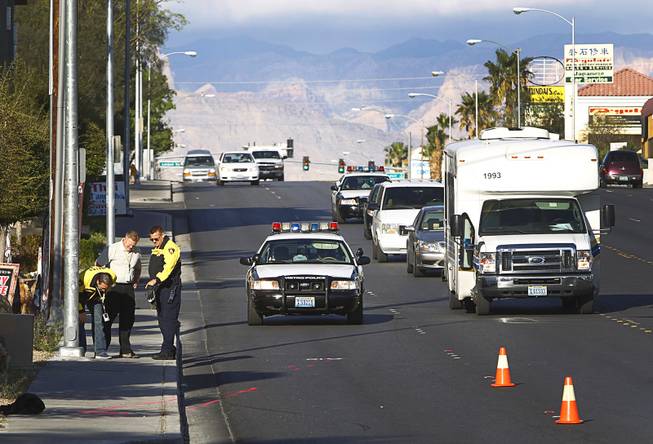
Metro Police investigate a fatal auto-pedestrian accident on Spring Mountain Road between Decatur Boulevard and Lindell Road Wednesday, March 26, 2014.
Tuesday, July 8, 2014 | 5:39 p.m.
The Mercury Grand Marquis looked more like a van by the time Metro Police Lt. David Jacoby arrived on the scene Monday night.
When the car went off the road at Russell Road and Sandhill Road, it hit a power pole head-on and the car crumpled. All three occupants were badly injured, but the passenger in the back seat was hurt the worst.
He wasn't wearing his seatbelt, and he hit the driver's seat so hard he forced it all the way to the steering wheel. He was transported to Sunrise Hospital in critical condition, but it didn't have to be that way, Jacoby said.
“If he had been seat-belted in,” Jacoby said, “the injuries would probably have been less critical.”
It's the job of Jacoby, who works in Metro's traffic bureau, to think of ways to stop these kinds of accidents and injuries from happening.
He and other members of the Southern Nevada Traffic Safety Committee, which pulls together Metro officers, community members and county officials to think of ways to improve traffic safety, keep a close eye on the statistics.
There have been 40 traffic-related fatalities in Metro’s jurisdiction so far in 2014, and while that's a lower number compared to the same period in the past two years, numbers are up in other traffic categories. Pedestrian fatalities and motorcycle deaths are up by more than a third this year.
The committee, formed in 2012, meets regularly and commits resources to educating the public and reminding residents about doing the little things, like looking both ways before crossing a street or wearing a seatbelt, to prevent an accident.
Sheriff Doug Gillespie has a familiar solution: More cops on the ground.
He looks to the three E’s to combat the problem: engineering, education and enforcement. He puts a special emphasis on that last one.
“Cops make a difference,” he said.
Gillespie said there’s a universal reaction when driving next to a police cruiser.
“You slow down,” he said. “For anyone to tell me that men and women out there in uniform in marked vehicles don’t impact traffic safety in a positive way, they’re not being honest with themselves.”
In the past, Gillespie said, Metro had enough officers to devote a significant portion to run radar traps in areas where traffic accidents occurred most frequently. Now Metro doesn’t have the manpower to spare, he said.
Jacoby agreed. The traffic bureau is down by 25 officers this year, and he said the staffing hurts when it comes time to stake out dangerous roads and intersections throughout the valley and go after reckless drivers. According to Jacoby, Metro is in the process of putting more recruits through its police academy, but those officers won’t be available to patrol for a couple of years.
“We’ve gone down and down to the point where, when anybody leaves, we have to fight with the other bureaus to get a body back,” Jacoby said.
Gillespie’s campaign to hire more Metro officers by instituting a .15 percent increase in the county sales tax was defeated by the County Commission in January. With the defeat of the “More Cops” tax, Gillespie said at the time that Metro could be forced to eliminate 700 officer positions by 2020.
In the absence of a fully bolstered force, the Southern Nevada Traffic Safety Committee has made education a key priority. The group hands out fliers at events all over town, produces public service announcements and even takes members of the public out for “Coffee with a Cop.”
The committee brainstorms creative ways to deal with the challenges, from examining how public engineers design roads and pedestrian byways to looking at safety solutions currently in effect in other states.
Gillespie said he had seen the education approach work, especially with the push to reduce DUIs. The committee looks especially at targeting young people to reduce the prevalence of reckless behavior in the future. DUI arrests dropped from 3,700 in 2012 to 3,200 in 2013, according to Metro statistics.
“You have to give it some time and you can’t give up on it,” Gillespie said.

Join the Discussion:
Check this out for a full explanation of our conversion to the LiveFyre commenting system and instructions on how to sign up for an account.
Full comments policy